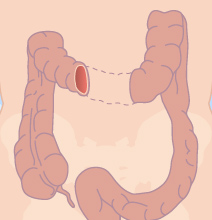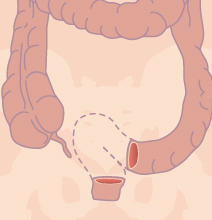Surgery
Surgery is probably the most common treatment for colorectal cancer whatever its stage of development.

It aims to remove the initial tumor from the colon or rectum in an attempt to eliminate the cancer.
Most surgeries to the colon are conservative, meaning that they remove just part of it (a third or a quarter of its length), carrying no complications to the patient's quality of life.
Surgery for rectal cancer is often more complicated due to the narrowness of the pelvic bone. The area also contains the nerves that control sexual and urinary functions, so extra care must be taken to avoid damage.
During surgery, all lymph nodes near the tumor are also removed to guarantee that no malignant cells escape and enter the lymphatic system. The removed nodules are sent for pathological analysis, to determine the cancer stage.
Learn more about the surgeries performed for the treatment of colon cancer and the treatment of rectal cancers. .





